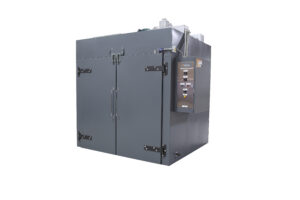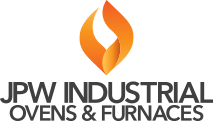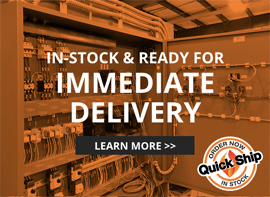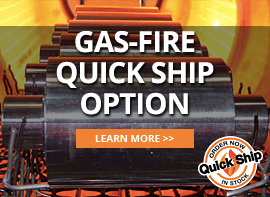Industrial drying ovens are integral components in various manufacturing processes that remove moisture from materials. From electronics to pharmaceuticals, these ovens play a crucial role in ensuring the quality and safety of products. This concise guide sheds light on the operational principles of industrial drying ovens, their types, key features, and best practices for their efficient use.
Their History

Industrial drying ovens, crucial in the manufacturing sector for the dehydration of materials, trace their origins back to the late 19th and early 20th centuries. This period marked a significant transition from manual labor to mechanized processes in various industries. The invention of the industrial drying oven was pivotal, primarily to accommodate the demand for mass-produced goods. These ovens were initially designed to improve the efficiency and quality of products by reducing moisture content, thereby preventing spoilage and enhancing durability. Over the years, advancements in technology and engineering have significantly evolved these ovens. Today, they incorporate precise temperature controls, uniform air distribution, and energy-efficient designs to cater to various industries.
Understanding Industrial Drying Ovens
At their core, industrial drying ovens are designed to provide controlled, high-temperature environments for effectively removing water or solvents from materials. They operate on the principle of forced convection; a fan circulates hot air across the material, ensuring uniform drying. The precision in temperature control, airflow pattern, and timing distinguishes industrial drying ovens. It makes them indispensable in critical applications where moisture content must be meticulously managed.
Types of Industrial Drying Ovens
There are several types of drying ovens, each suited to specific applications based on temperature range, size, and airflow design. Batch ovens, for example, process discrete quantities of material in a single batch, which is ideal for small-scale or varied operations. Conveyor ovens, in contrast, are designed for continuous processing, where materials are fed into the oven at one end and emerge dry at the other, suitable for large-scale manufacturing.
In addition to batch and conveyor ovens, several other types of drying ovens cater to a wide range of industrial needs. Vacuum drying ovens, for instance, are vital in applications requiring the removal of moisture or solvents from heat-sensitive materials without overheating them. By reducing the pressure within the chamber, these ovens can dry materials at lower temperatures, decreasing the risk of altering or damaging the product. Another innovative variant is the rotary drying oven, designed to tumble materials within the drying chamber, ensuring uniform heat distribution and efficient moisture removal. This type of oven is especially beneficial for granular, powdery, or somewhat lump materials that need consistent drying throughout. These drying ovens offer unique benefits, making them indispensable tools in their respective application domains, from electronics manufacturing to pharmaceuticals and beyond.
Key Features to Consider
Choosing the right industrial drying oven involves understanding several critical features. Temperature uniformity and stability are paramount to ensure consistent drying. The oven’s size and capacity must match the operation’s throughput requirements. Additionally, the type of heating method (electric, gas, infrared) and the efficiency of the oven’s insulation can significantly impact operational costs.
Operating Industrial Drying Ovens Safely and Efficiently
To ensure safety and efficiency when operating industrial drying ovens, one of the fundamental practices is to conduct regular maintenance checks. These checks help identify potential issues before they escalate into significant problems, extending the oven’s lifespan and ensuring it operates efficiently. Proper operator training cannot be overstated; all personnel operating or working near the oven must be fully aware of the operational procedures, safety protocols, and emergency measures. This training should cover everything from the correct loading and unloading of the oven to understanding the control settings and interpreting warning signals. Adherence to safety standards, including those set by the National Fire Protection Association (NFPA), is mandatory to prevent fire hazards and ensure the safe operation of the equipment. Monitoring the oven’s performance is another critical aspect, as it helps in the early detection of wear or malfunction, preventing accidents and costly downtime. Implementing these practices promotes a safe working environment and enhances the efficiency and productivity of industrial drying processes.
Best Practices for Optimal Performance
To maximize the performance of a drying oven, operators should ensure that the load is distributed evenly to facilitate uniform airflow and drying. Precautions should be taken to prevent overload, leading to inefficient operation and increased energy consumption. Regular calibration and inspection of temperature controls, sensors, and ventilation systems are essential to maintain the oven’s accuracy and efficiency.
How Can JPW Help?
The demand for efficient, reliable, high-quality industrial drying ovens is critical for numerous sectors, including manufacturing, aerospace, automotive, and pharmaceuticals. Choosing the right partner for these essential components cannot be overstated. JPW Industrial Ovens and Furnaces stands out as a leader in providing solutions that meet the unique needs of each industry. With a focus on durability, precision, and energy efficiency, JPW Industrial Ovens and Furnaces ensures that your operations run smoothly and effectively, maximizing productivity and minimizing downtime.
JPW Industrial Ovens and Furnaces’ commitment to excellence extends beyond their product offerings. Our team of experts is dedicated to understanding your specific requirements and challenges, providing personalized service and support from the initial consultation to installation and beyond. Whether you need a standard drying oven or a customized solution built to specific dimensions and specifications, we have the expertise and the capacity to deliver. Choosing JPW means investing in a partnership that will help you confidently achieve your production goals, backed by quality equipment and exceptional service.


